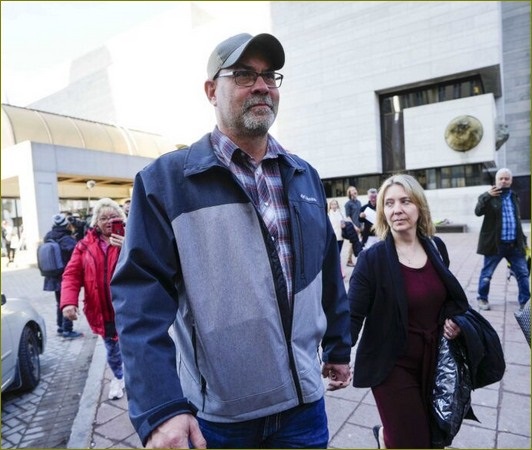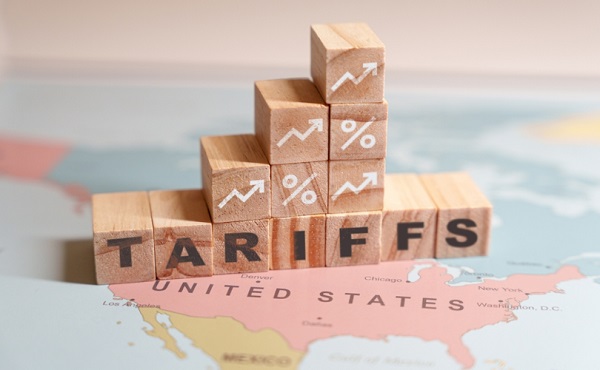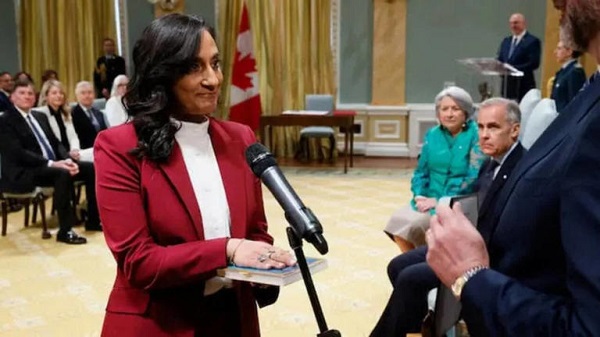Crime
LA Mayor Karen Bass Makes New Demands Of Trump At Monday Night Press Conference


From the Daily Caller News Foundation
By Mariane Angela
During a Monday night press briefing, Democratic Los Angeles Mayor Karen Bass told the Trump administration to stop the Immigration and Customs Enforcement (ICE) raids in Los Angeles.
President Donald Trump deployed the National Guard to Los Angeles on Saturday after riots erupted following an ICE raid at a Home Depot. During Monday’s press briefing, Bass called for an end to the raids conducted by the Trump administration, claiming that the power to deploy troops or request assistance should lie with state and local officials, not the federal government.
“I would say stop the raids. Stop the raids, period. I would say give the power back to our governor, and if we need the National Guard, we can do it in the normal circumstances, which is the request is made local, and the governor decides, or not to, grant that to our city,” Bass said when asked what she would say to the Trump administration.
Bass reiterated her earlier stance and questioned the need for an additional military presence, given the National Guard’s current role in securing federal buildings.
WATCH:
“We didn’t need the National Guard. Why on earth? What are they going to do? Do you know what the National Guard is doing now? They are guarding two buildings,” Bass said when asked to react to the deployment of Marines.
Bass then called the deployment an unjustified and overreaching action.
“They are guarding the federal building here in downtown, and they’re guarding the federal building in Westwood. That’s what they’re doing. So they need Marines on top of it? I don’t understand that. That’s why I feel like we are part of an experiment that we did not ask to be a part of,” Bass added.
Despite Bass claiming that the National Guard’s deployment was unnecessary, Fox News reporter Bill Melugin shared videos showing ICE agents in one of the vehicles being struck by rocks. Melugin also posted additional footage and photos of the aftermath, including an image of an ICE agent’s injury and a windshield damaged by a rioter’s rock.
Around 1,000 individuals wreaked havoc in Los Angeles Friday night, surrounding a federal building, attacking ICE agents, deflating tires and vandalizing government property, according to the Department of Homeland Security. The unrest caused significant damage and severe traffic disruptions, bringing several key city roads to a complete standstill.
On Saturday night, Trump authorized the deployment of the National Guard to assist local law enforcement and warned Democratic California Gov. Gavin Newsom that the federal government would intervene if local authorities failed to restore order.
In response, California filed a lawsuit against the Trump administration Monday, challenging the deployment of National Guard troops to Los Angeles to address the immigration riots. Attorney General Rob Bonta and Newsom said that federalizing 2,000 California National Guard members without Newsom’s consent exceeded the president’s authority.
Crime
Ontario Police’s Record Fentanyl Bust Suggests Cartel–Iranian–PRC-Supplied Nexus from Ottawa to Hamilton Along Six Nations Corridor

Investigators found that packages were being shipped across Canada using both courier services and Canada Post. The digital reach of the network spanned nearly the entire country: Alberta, British Columbia, Manitoba, New Brunswick, Nunavut, Nova Scotia, Ontario, Prince Edward Island, and Quebec.
In a pair of sweeping investigations unveiled yesterday, the Ontario Provincial Police announced the largest fentanyl seizure in the force’s history—more than 43.5 kilograms of deadly synthetic opioids, including fentanyl, carfentanil, and precursor substances—enough to generate over 435,000 potentially lethal street doses. Nearly 20 suspects were arrested and more than 200 criminal charges laid in connection with the operations, codenamed Project Bionic and Project Golden.
The twin probes targeted sophisticated fentanyl trafficking networks that stretched across southern Ontario, extending northeast into the nation’s capital, Ottawa, and penetrating the national mail and courier systems. The seizures—made in locations ranging from Hamilton-area homes to Ottawa postal depots—come amid mounting warnings from U.S. security officials that Canadian territory is increasingly being exploited by Mexican and Chinese cartel networks, often intertwined with Iranian state-aligned trafficking and laundering operations.
The Bureau, a leading authority on North American fentanyl trafficking and Canada’s structural vulnerabilities, has reported extensively on Chinese-run illegal marijuana operations and cartel-affiliated smuggling corridors spanning British Columbia, Quebec, and Indigenous territories in southern Ontario. These networks operate near Hamilton and Six Nations and extend eastward through the Ottawa-Cornwall corridor to the New York State border, where key enforcement actions linked to Project Golden were concentrated.
OPP Commissioner Thomas Carrique called the busts historic in scope.
“Although these two investigations are independent, they both resulted in alarming seizures of fentanyl and reveal a complex level of drug trafficking,” he said at a press conference in Orillia. “These operations occurred at opposite ends of our province, which underscores that this is a province-wide public safety issue.”
“Between these investigations, there was a staggering 43 kilos of fentanyl seized,” Carrique added, “which equates to about 435,000 potentially lethal street doses.”
Launched in November 2024 by the OPP Covert Internet Intelligence Unit, Project Bionic was the force’s first major dark web narcotics probe. The investigation—led by the Organized Crime Enforcement Bureau—targeted a trafficking operation that processed high volumes of drug orders via encrypted marketplaces. Investigators found that packages were being shipped across Canada using both courier services and Canada Post. The digital reach of the network spanned nearly the entire country: Alberta, British Columbia, Manitoba, New Brunswick, Nunavut, Nova Scotia, Ontario, Prince Edward Island, and Quebec.
On Monday, March 10, 2025, OPP officers arrested two individuals at a Canada Post location in Ottawa and seized 86 packages containing various drugs ready to be shipped across the country. The raids yielded more than 27 kilograms and 64,000 tablets, representing 37 different illegal drugs and diverted prescription medications, including fentanyl, hydromorphone, methamphetamine, ketamine, MDMA, and others. Officers also seized $95,000 in cash, a firearm, and two stolen luxury vehicles. Among them was a stolen 2018 Ferrari 488 Spider convertible, valued at over $400,000. Investigators also recovered fraudulent licence plates and reprogrammable key fobs, highlighting the operation’s links to broader auto theft and financial crime networks.
Later that month, police recovered an additional 11 stolen vehicles. Four Ottawa-area individuals were arrested and now face a total of 85 charges.
Among those charged was 26-year-old Amr Hammami, who faces 56 counts under the Criminal Code and the Controlled Drugs and Substances Act. Charges include possession of prohibited firearms and ammunition, laundering proceeds of crime, and trafficking or possession for the purpose of trafficking in fentanyl, cocaine, methamphetamine, heroin, MDMA, ketamine, oxycodone, hydromorphone, alprazolam, and methylphenidate. Police allege Hammami coordinated drug shipments, managed laundering operations, and operated from within Ottawa’s urban core.
“Project Bionic exposed the alarming volume of dangerous drugs being sold through dark web marketplaces, with packages shipped across the country,” Carrique said. “These arrests show that law enforcement can track and stop even the most complex online trafficking operations. This investigation also plainly demonstrates the connections between drug trafficking and other crimes, such as auto theft and illegal firearms. This seizure is a major step in dismantling drug networks—whether online or on the street—and reflects the OPP’s ongoing commitment to public safety.”
The dark web refers to a portion of the internet not indexed by standard search engines. It requires specialized software to access and employs encrypted communication protocols to conceal users and platforms. Within it, marketplaces operate as anonymous forums for criminal transactions—trading in everything from drugs and stolen data to counterfeit pharmaceuticals and hacking tools.
Project Golden, launched in July 2024, tracked a sprawling fentanyl distribution ring with supply hubs in Hamilton, Oxford, Norfolk, Burlington, Mississauga, York, and Toronto. On May 28, police executed 16 coordinated search warrants targeting residences, businesses, and vehicles. They seized $5.4 million in narcotics, including 38 kilograms of fentanyl—the largest single fentanyl seizure in OPP history—alongside 19.5 kg of methamphetamine, 5.5 kg of cocaine, MDMA, psilocybin, three guns, three vehicles, and $121,600 in cash.
Fifteen individuals were arrested under Project Golden, facing 140 charges including conspiracy, trafficking, and weapons offenses. One of the central figures was 44-year-old Matthew Savory, who faces 70 charges, including two counts of trafficking carfentanil, and conspiracy to traffic in fentanyl, cocaine, and methamphetamine.
Despite the operation’s scope, Commissioner Carrique urged reporters not to fixate on whether the fentanyl was U.S.-bound. “There’s no indication the fentanyl was destined for the United States or any other country,” he said.
But The Bureau’s prior investigations suggest a more complex picture. In 2022, Montreal trafficker Arden McCann—known online as “The Mailman”—was indicted in the Northern District of Georgia for mailing synthetic opioids from Canada and China into all 49 U.S. states. McCann’s dark web network—located 192 kilometres from Ottawa, the Project Bionic dark web nexus—generated more than $10 million in revenue, using Canada Post and encrypted platforms—an operational model nearly identical to Project Bionic.
As part of that investigation, DEA agents and Canadian authorities seized two million counterfeit Xanax pills, five industrial pill presses, $200,000 in cash, 15 firearms, ballistic vests, and detailed ledgers showing transactions with Chinese precursor suppliers.
Investigators say the geography of southwestern Ontario—stretching from Hamilton to Six Nations and down to the Buffalo border—makes it a key strategic zone for cartel activity. The Bureau previously revealed a related cartel-linked bust on Six Nations reserve land, where counterfeit tobacco production and drug trafficking thrived in a jurisdictional grey zone.
The timing and location of Project Golden, coming shortly after the Six Nations-based Project Panda raids, suggest links. Both operations targeted the same narcotics distribution corridors between Brantford and Hamilton, uncovering fentanyl, firearms, and vehicles connected to high-level criminal networks.
The findings align with concerns raised by FBI Director Kash Patel, who recently warned that cartels were increasingly exploiting Canada as a fentanyl staging ground.
While the OPP emphasized the domestic impact of removing 43.5 kilograms of fentanyl from circulation, law enforcement experts warn that without structural reforms—including a Canadian anti-racketeering law, enhanced port and border surveillance, stricter chemical import tracking, and expanded financial intelligence enforcement—Canada will remain a vulnerable node in the transnational opioid web.
The Bureau is a reader-supported publication.
To receive new posts and support my work, consider becoming a free or paid subscriber.
Invite your friends and earn rewards
Crime
Letter Shows Biden Administration Privately Warned B.C. on Fentanyl Threat Years Before Patel’s Public Bombshells

Fentanyl super lab busted in BC
In recent interviews with Joe Rogan and Fox News, FBI Director Kash Patel alleged that Vancouver has become a global hub for fentanyl production and export—part of a transnational network linking Chinese Communist Party-associated suppliers and Mexican drug cartels, and exploiting systemic weaknesses in Canada’s border enforcement. “What they’re doing now … is they’re shipping that stuff not straight [into the United States],” Patel told Rogan, citing classified intelligence. “They’re having the Mexican cartels now make this fentanyl down in Mexico still, but instead of going right up the southern border and into America, they’re flying it into Vancouver. They’re taking the precursors up to Canada, manufacturing it up there, and doing their global distribution routes from up there because we’ve been so effective down south.”
His comments prompted a public response from B.C. Premier David Eby’s top cop, Solicitor General Garry Begg, who disputed the scale of the allegations.
Controversially, Patel also asserted that Washington believes Beijing is intentionally targeting the United States with fentanyl to harm younger generations—especially for strategic purposes.
But a diplomatic letter obtained exclusively by The Bureau supports the view that high-level U.S. concerns—nearly identical to Patel’s—were privately raised by U.S. Secretary of State Antony Blinken two years earlier.
The Blinken letter suggests that these concerns were already being voiced at the highest levels of U.S. diplomacy and intelligence in 2023—under a Democratic administration—which counters a widespread misperception in Canadian political and media spheres that the Trump administration has distorted facts about Vancouver’s role in global fentanyl trafficking logistics.
In a letter dated May 25, 2023, U.S. Secretary of State Antony Blinken wrote to Port Coquitlam Mayor Brad West, thanking him for participating in a fentanyl-focused roundtable at the Cities Summit of the Americas in Denver. According to West, only several mayors were invited to discuss the FBI’s strategic focus on transnational organized crime and fentanyl trafficking—an indication of the summit’s targeted focus on British Columbia. “Thank you for discussing your city’s experiences with synthetic opioids and providing valuable lessons learned we can share throughout the region,” Blinken wrote.
The letter suggested U.S. officials were not only increasingly seeing Canadian municipalities as critical partners in a hemispheric fight against synthetic drug trafficking, but viewed Mayor West as a trusted partner in British Columbia.
West told The Bureau that Blinken privately expressed the same controversial and jarring assessment that Patel later made publicly—essentially arguing that the U.S. government had assessed that China is intentionally weaponizing fentanyl against North America, and that Chinese Communist Party-linked networks are strategically operating in concert with Latin cartels.
According to The Bureau’s reporting, Blinken described growing frustration among U.S. federal agencies over Canada’s legal and enforcement deficiencies. He pointed to what American officials saw as systemic obstacles in Canadian law that made it difficult to act on intelligence involving fentanyl production, chemical precursor shipments, and laundering operations tied to cartel and CCP-linked actors.
West told The Bureau that the U.S. government was alarmed that a major money laundering investigation in British Columbia—targeting the notorious Sam Gor synthetic narcotics syndicate, which collaborates with Mexican cartels in Western Hemisphere fentanyl trafficking and money laundering, according to U.S. experts—had collapsed in Canadian court proceedings. The Bureau has confirmed with a Canadian police veteran that this investigation originated from U.S. government intelligence.
West, a vocal critic of Canada’s handling of transnational organized crime, said U.S. agencies had begun withholding sensitive intelligence, citing a lack of confidence in Canada’s ability—or willingness—to act on it.
Blinken also framed the crisis in a broader hemispheric context, noting that while national leaders met at the Ninth Summit of the Americas in Los Angeles to address the shared challenges facing the region, it was city leaders who served at the forefront of tackling those threats.
Patel’s recent public statements—which singled out Vancouver as a production hub and described air and sea trafficking routes into the U.S.—have revived the debate around Canada’s role in the opioid crisis. U.S. experts, such as former senior DEA investigator Donald Im, argue that northern border seizure statistics do not capture the majority of fentanyl activity emanating from Canada as monitored by U.S. law enforcement.
Im cited, for example, the case of Arden McCann, a Montreal man indicted in the Northern District of Georgia and accused of mailing synthetic opioids—including fentanyl, carfentanil, U-47700, and furanyl fentanyl—from Canada and China into the United States. According to the indictment, McCann—also known as “The Mailman” and “Dr. Xanax”—trafficked quantities capable of causing mass casualty events. He was later sentenced to 30 years in federal prison for operating a dark web narcotics network that, between 2015 and 2020, distributed fentanyl to 49 states and generated more than $10 million in revenue.
As part of that investigation, the DEA reported that Canadian authorities seized approximately two million counterfeit Xanax pills, five pill presses, alprazolam powder, 3,000 MDMA pills, more than $200,000 in cash, 15 firearms, ballistic vests, and detailed drug ledgers. The ledgers showed that McCann and his co-conspirators purchased alprazolam from suppliers in China, pressed the powder into counterfeit Xanax pills, and sold the product to U.S. buyers via dark web marketplaces.
-

 Also Interesting2 days ago
Also Interesting2 days agoThe Best US Hopes for Wimbledon 2025: Who Could Break the Curse at SW19?
-

 espionage2 days ago
espionage2 days agoFBI Director: CCP Behind Wave of Pathogen Smuggling as Third Chinese Student Charged in Michigan Lab Probe
-

 Business2 days ago
Business2 days agoAlberta’s Nate Horner scores a B on CTF Finance Minister Report Card – Second highest rating in Canada
-

 Immigration2 days ago
Immigration2 days agoMass immigration can cause enormous shifts in local culture, national identity, and community cohesion
-

 Freedom Convoy1 day ago
Freedom Convoy1 day agoFreedom Convoy leader Chris Barber to learn in July whether or not he could face jail time
-

 Health2 days ago
Health2 days agoRFK Jr. purges CDC vaccine panel, citing decades of ‘skewed science’
-

 Business1 day ago
Business1 day agoEU investigates major pornographic site over failure to protect children
-

 Crime15 hours ago
Crime15 hours agoOntario Police’s Record Fentanyl Bust Suggests Cartel–Iranian–PRC-Supplied Nexus from Ottawa to Hamilton Along Six Nations Corridor





